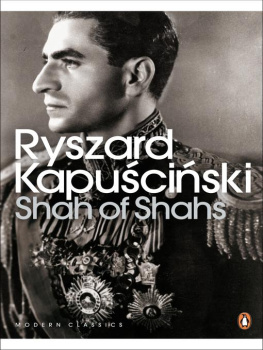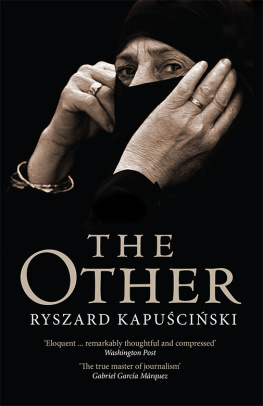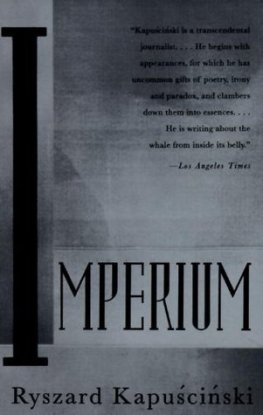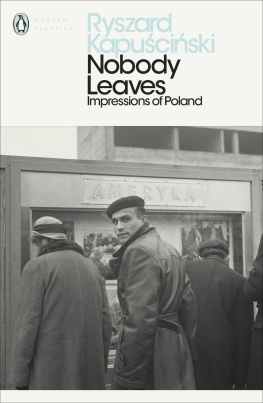Ryszard Kapuscinski - Travels with Herodotus (Vintage International)
Here you can read online Ryszard Kapuscinski - Travels with Herodotus (Vintage International) full text of the book (entire story) in english for free. Download pdf and epub, get meaning, cover and reviews about this ebook. year: 2008, publisher: Vintage, genre: Detective and thriller. Description of the work, (preface) as well as reviews are available. Best literature library LitArk.com created for fans of good reading and offers a wide selection of genres:
Romance novel
Science fiction
Adventure
Detective
Science
History
Home and family
Prose
Art
Politics
Computer
Non-fiction
Religion
Business
Children
Humor
Choose a favorite category and find really read worthwhile books. Enjoy immersion in the world of imagination, feel the emotions of the characters or learn something new for yourself, make an fascinating discovery.

- Book:Travels with Herodotus (Vintage International)
- Author:
- Publisher:Vintage
- Genre:
- Year:2008
- Rating:3 / 5
- Favourites:Add to favourites
- Your mark:
- 60
- 1
- 2
- 3
- 4
- 5
Travels with Herodotus (Vintage International): summary, description and annotation
We offer to read an annotation, description, summary or preface (depends on what the author of the book "Travels with Herodotus (Vintage International)" wrote himself). If you haven't found the necessary information about the book — write in the comments, we will try to find it.
Ryszard Kapuscinski: author's other books
Who wrote Travels with Herodotus (Vintage International)? Find out the surname, the name of the author of the book and a list of all author's works by series.
Travels with Herodotus (Vintage International) — read online for free the complete book (whole text) full work
Below is the text of the book, divided by pages. System saving the place of the last page read, allows you to conveniently read the book "Travels with Herodotus (Vintage International)" online for free, without having to search again every time where you left off. Put a bookmark, and you can go to the page where you finished reading at any time.
Font size:
Interval:
Bookmark:
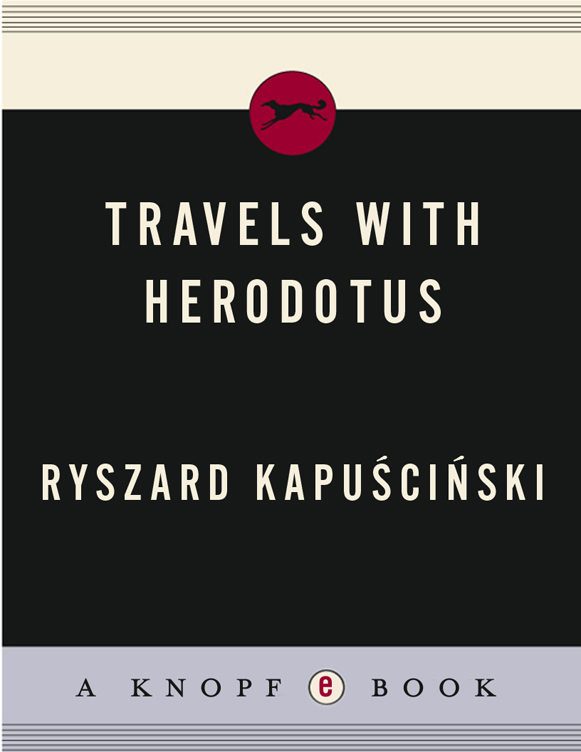
ALSO BY RYSZARD KAPUSCINSKI
The Shadow of the Sun
Imperium
The Soccer War
The Emperor
Shah of Shahs
Another Day of Life
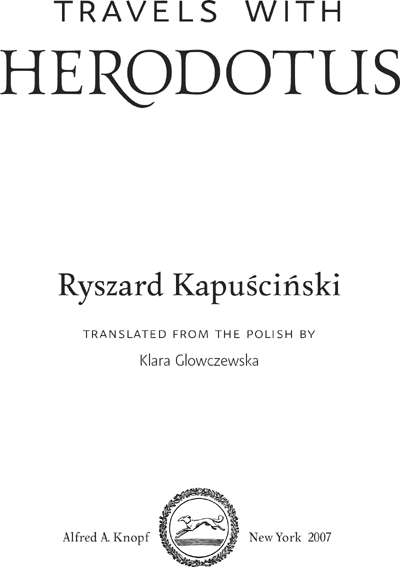
I am like one of those old books that ends up moldering for lack of having been read. Theres nothing to do but spin out the thread of memory and, from time to time, wipe away the dust building up there.
SENECA
All memory is present.
NOVALIS
We are, all of us, pilgrims who struggle along different paths toward the same destination.
ANTOINE DE SAINT-EXUPRY
B efore Herodotus sets out on his travels, ascending rocky paths, sailing a ship over the seas, riding on horseback through the wilds of Asia; before he happens upon the mistrustful Scythians, discovers the wonders of Babylon, and plumbs the mysteries of the Nile; before he experiences a hundred different places and sees a thousand inconceivable things, he will appear for a moment in a lecture on ancient Greece, which Professor Bieuska-Malowist delivers twice weekly to the first-year students in Warsaw Universitys department of history. He will appear and just as quickly vanish. He will disappear so completely that now, years later, when I look through my notes from those classes, I do not find his name. There are Aeschylus and Pericles, Sappho and Socrates, Heraclitus and Plato; but no Herodotus. And yet we took such careful notes. They were our only source of information. The war had ended six years earlier, and the city lay in ruins. Libraries had gone up in flames, we had no textbooks, no books at all to speak of.
The professor has a calm, soft, even voice. Her dark, attentive eyes regard us through thick lenses with marked curiosity. Sitting at a high lectern, she has before her a hundred young people the majority of whom have no idea that Solon was great, do not know the cause of Antigones despair, and could not explain how Themistocles lured the Persians into a trap.
If truth be told, we didnt even quite know where Greece was or, for that matter, that a contemporary country by that name had a past so remarkable and extraordinary as to merit studying at university. We were children of war. High schools were closed during the war years, and although in the larger cities clandestine classes were occasionally convened, here, in this lecture hall, sat mostly girls and boys from remote villages and small towns, ill read, undereducated. It was 1951. University admissions were granted without entrance examinations, family provenance mattering mostin the communist state the children of workers and peasants had the best chances of getting in.
The benches were long, meant for several students, but they were still too few and so we sat crowded together. To my left was Z.a taciturn peasant from a village near Radomsko, the kind of place where, as he once told me, a household would keep a piece of dried kielbasa as medicine: if an infant fell ill, it would be given the kielbasa to suck. Did that help? I asked, skeptically. Of course, he replied with conviction and fell into gloomy silence again. To my right sat skinny W., with his emaciated, pockmarked face. He moaned with pain whenever the weather changed; he said he had taken a bullet in the knee during a forest battle. But who was fighting against whom, and exactly who shot him, this he would not say. There were also several students from better families among us. They were neatly attired, had nicer clothes, and the girls wore high heels. Yet they were striking exceptions, rare occurrencesthe poor, uncouth countryside predominated: wrinkled coats from army surplus, patched sweaters, percale dresses.
The professor showed us photographs of antique sculptures and of Greek figures painted on brown vasesbeautiful, statuesque bodies, noble, elongated faces with fine features. They belonged to some unknown, mythic universe, a world of sun and silver, warm and full of light, populated by slender heroes and dancing nymphs. We didnt know what to make of it. Looking at the photographs, Z. was morosely silent and W. contorted himself to massage his aching knee. Others looked on, attentive yet indifferent. Before those future prophets proclaiming the clash of civilizations, the collision was taking place long ago, twice a week, in the lecture hall where I learned that there once lived a Greek named Herodotus.
I knew nothing as yet of his life, or about the fact that he left us a famous book. We would in any event have been unable to read The Histories, because at that moment its Polish translation was locked away in a closet. In the mid-1940s The Histories had been translated by Professor Seweryn Hammer, who deposited his manuscript in the Czytelnik publishing house. I was unable to ascertain the details because all the documentation disappeared, but it happens that Hammers text was sent by the publisher to the typesetter in the fall of 1951. Barring any complications, the book should have appeared in 1952, in time to find its way into our hands while we were still studying ancient history. But thats not what happened, because the printing was suddenly halted. Who gave the order? Probably the censor, but its impossible to know for certain. Suffice it to say that the book finally did not go to press until three years later, at the end of 1954, arriving in the bookstores in 1955.
One can speculate about the delay in the publication of The Histories. It coincides with the period preceding the death of Stalin and the time immediately following it. The Herodotus manuscript arrived at the press just as Western radio stations began speaking of Stalins serious illness. The details were murky, but people were afraid of a new wave of terror and preferred to lie low, to risk nothing, to give no one any pretext, to wait things out. The atmosphere was tense. The censors redoubled their vigilance.
But Herodotus? A book written two and a half thousand years ago? Well, yes: because all our thinking, our looking and reading, was governed during those years by an obsession with allusion. Each word brought another one to mind; each had a double meaning, a false bottom, a hidden significance; each contained something secretly encoded, cunningly concealed. Nothing was ever plain, literal, unambiguousfrom behind every gesture and word peered some referential sign, gazed a meaningfully winking eye. The man who wrote had difficulty communicating with the man who read, not only because the censor could confiscate the text en route, but also because, when the text finally reached him, the latter read something utterly different from what was clearly written, constantly asking himself: What did this author really want to tell me?
And so a person consumed, obsessively tormented by allusion reaches for Herodotus. How many allusions he will find there! The Histories consists of nine books, and each one is allusions heaped upon allusions. Let us say he opens, quite by accident, Book Five. He opens it, reads, and learns that in Corinth, after thirty years of bloodthirsty rule, the tyrant called Cypselus died and was succeeded by his son, Periander, who would in time turn out to be even more bloodthirsty than his father. This Periander, when he was still a dictator-in-training, wanted to learn how to stay in power, and so sent a messenger to the dictator of Miletus, old Thrasybulus, asking him for advice on how best to keep a people in slavish fear and subjugation.
Font size:
Interval:
Bookmark:
Similar books «Travels with Herodotus (Vintage International)»
Look at similar books to Travels with Herodotus (Vintage International). We have selected literature similar in name and meaning in the hope of providing readers with more options to find new, interesting, not yet read works.
Discussion, reviews of the book Travels with Herodotus (Vintage International) and just readers' own opinions. Leave your comments, write what you think about the work, its meaning or the main characters. Specify what exactly you liked and what you didn't like, and why you think so.

